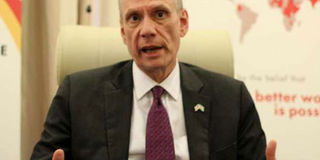Stop talk and take action on corruption

United States Ambassador to Kenya Robert Godec addresses the media in Kisumu on November 3, 2016. He has said Kenyans can end the scourge of corruption. PHOTO | TOM OTIENO | NATION MEDIA GROUP
What you need to know:
- In a recent Pew Research Center survey, 91 per cent of Kenyans called government corruption a “very big problem”.
- Right now, US advisers are working with Kenyan police accountability agencies to end impunity in the police service.
Kenyans have talked about corruption for years.
They know it is undermining the country’s prosperity, security, development, and even democracy.
In a recent Pew Research Center survey, 91 per cent of Kenyans called government corruption a “very big problem”.
What is needed now, however, is not talk, but serious, sustained action.
The United States stands with Kenya in the fight against corruption, but the scourge will continue unless Kenyans themselves put a stop to it.
Kenyans can do it and the steps needed are clear.
In July 2015, President Obama and President Kenyatta made an unprecedented pledge — the Kenya-US Joint Commitment on Good Governance and Anti-Corruption Activities in Kenya — to work together to confront this problem.
The United States is fulfilling its end of this pledge.
US investigators collaborated with their Kenyan counterparts to create a special unit to investigate crimes involving corruption, which recently made its first arrests.
Right now, US advisers are working with Kenyan police accountability agencies to end impunity in the police service.
US and Kenyan prosecutors are collaborating to share evidence on criminal cases.
WORK TO DO
And US experts have assisted Kenya to develop a mandatory ethics training programme for public servants.
The US embassy has also launched a multi-year, multi-million-dollar effort to help Kenya reduce the risk of corruption in the counties, where there are reports of serious problems.
We have funded programmes to help Kenya’s customs authorities root out smuggling at the port of Mombasa.
We have expanded our assistance to help Kenya develop new tools to fight money laundering, deepen engagement with international anti-corruption initiatives, increase the transparency of its procurement system, and strengthen anti-corruption and whistleblower protection legislation.
And we continue to deny visas to Kenyans who are involved in corruption.
And we have done it without fanfare because the United States cannot lead this fight.
We cannot win it for you. There remains much more work to do, and Kenyans must do it.
The United States welcomes the steps already taken by President Kenyatta and the government.
It is important to acknowledge these actions, which include removing Cabinet secretaries and other senior officials.
We also welcome the conviction of 22 Kenyans since the beginning of 2016, including a former member of Parliament, for corruption crimes.
These are the first such convictions since 2012. But these steps are not enough. More is needed, and quickly.
PLEASE ACT
First, officials should redouble efforts to thoroughly investigate reports of corruption, including the recent ones in the health sector.
When there is evidence of corruption, those responsible must be prosecuted regardless of political party, social stature, or personal connections.
And individuals found guilty must be punished, including with jail time and forfeiting the proceeds of their crimes.
With over 500 corruption cases in court already, the Judiciary should act swiftly to hear them and render judgments.
Second, Kenyans should build strong, reliable institutions and systems that reduce the opportunities for corruption.
Many specific steps are included in the joint commitment.
Some of these changes will not be easy, but there are no shortcuts.
President Kenyatta’s recent National Summit on Governance and Accountability highlighted what investigators, prosecutors, the Attorney-General, the Auditor-General, the Judiciary, and the government can do to be more effective.
The discussion emphasised, too, that every Kenyan should refuse to pay a bribe or ask for one.
Kenyans should report anyone they see engaged in crooked activity. Everyone must respect the rule of law.
Regrettably, however, too much of the public debate over corruption has involved name-calling, finger-pointing, and political bickering.
WORK TOGETHER
Some commentators have confused the issues by looking outward and placing blame where it does not lie.
For example, some have suggested the United States is blocking a thorough investigation of the Eurobond issue.
This is false. For the record, all information given to the embassy about the Eurobond was immediately passed to the appropriate US authorities.
If there is any evidence of corruption by American citizens or institutions, the US government will act. That I promise.
We have never denied Kenyan investigators, including the Auditor-General, the opportunity to travel to the US to carry out inquiries.
We do not side with one political party or another on the issue of corruption.
My country is not perfect; we too have struggled with corruption throughout our history.
But as we struggle, we strive to focus on the problem. Our answer has been to build strong institutions that ensure the rule of law.
I know Kenyans can end the scourge of corruption.
The challenge is for all Kenyans to join hands and act now to make the changes everyone knows are needed.
Mr Godec is the United States ambassador to Kenya.




